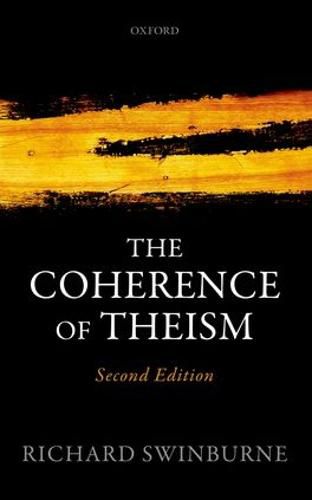Readings Newsletter
Become a Readings Member to make your shopping experience even easier.
Sign in or sign up for free!
You’re not far away from qualifying for FREE standard shipping within Australia
You’ve qualified for FREE standard shipping within Australia
The cart is loading…






The Coherence of Theism investigates what it means, and whether it is coherent, to say that there is a God. Richard Swinburne concludes that despite philosophical objections, most traditional claims about God are coherent (that is, do not involve contradictions); and although some of the most important claims are coherent only if the words by which they are expressed are being used in analogical senses, this is the way in which theologians have usually claimed that they are being used. When the first edition of this book was published in 1977, it was the first book in the new ‘analytic’ tradition of philosophy of religion to discuss these issues. Since that time there have been very many books and discussions devoted to them, and this new, substantially rewritten, second edition takes account of these discussions and of new developments in philosophy generally over the past 40 years. These discussions have concerned how to analyse the claim that God is ‘omnipotent’, whether God can foreknow human free actions, whether God is everlasting or timeless, and what it is for God to be a ‘necessary being’. On all these issues this new edition has new things to say.
$9.00 standard shipping within Australia
FREE standard shipping within Australia for orders over $100.00
Express & International shipping calculated at checkout
The Coherence of Theism investigates what it means, and whether it is coherent, to say that there is a God. Richard Swinburne concludes that despite philosophical objections, most traditional claims about God are coherent (that is, do not involve contradictions); and although some of the most important claims are coherent only if the words by which they are expressed are being used in analogical senses, this is the way in which theologians have usually claimed that they are being used. When the first edition of this book was published in 1977, it was the first book in the new ‘analytic’ tradition of philosophy of religion to discuss these issues. Since that time there have been very many books and discussions devoted to them, and this new, substantially rewritten, second edition takes account of these discussions and of new developments in philosophy generally over the past 40 years. These discussions have concerned how to analyse the claim that God is ‘omnipotent’, whether God can foreknow human free actions, whether God is everlasting or timeless, and what it is for God to be a ‘necessary being’. On all these issues this new edition has new things to say.